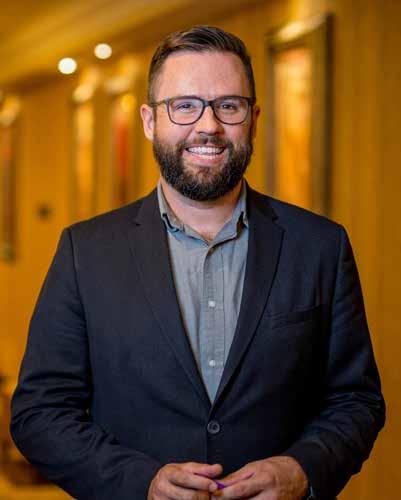
5 minute read
YOUR COLLEGE
Creative resilience
Alec Stratford, MSW, RSW
Advertisement
Registrar/Executive Director
For many who have attended the ethics training that I facilitate, you will have heard my story of how I came to social work. Early experiences with children and youth in an outdoor setting coupled with my passion for social justice and change, and journey of self-discovery.
Each year as I review the annual report submissions by the various committees of the College, my choice to enter the profession of social work is reinforced. The submissions unveil a snapshot of the work being done by social workers across Nova Scotia. It paints a clear picture of what hope, care and empathy look like when they are made central to human services.
While 2020 was a very tough year for many, what it made clear for all was the fundamental role that professional caring plays in our society. As governments shift agendas to address the core needs of Nova Scotians, social workers have continued to be there with the policy ideas that are needed, the skills to mobilize and organize core programs, and leadership in areas of grief, mental health, justice, and families and children. I am proud to be a social worker and believe that this year’s Social Work Month theme captured the role of social work in 2020: Social Work is Essential.
When I came to this role five years ago, I hoped that I would be able to support the mobilization of the profession’s values and principles towards greater social change, and aimed to build the College as a progressive organization leading change. It was a choice that required substantial change to the organization. It has required building capacity and the tools to capture the spirit of the already incredible work happening in the social work community across Nova Scotia, while working to maintain the highest ethical and practice standards for the public. The path forward has involved cultivating solid relationships with members, building credibility, and engaging with the wider community to challenge existing structures, in order to bring to life the vision that members have for the College when they adopted our strategic plan in 2018.
When I read through the submissions of this year’s annual report and the many contributions from the College’s six dedicated staff, its volunteers and our allies, I am inspired and motivated by these glimpses into the day-to-day work of our community, which align with my motivation for joining to enter our profession in the first place.
This year’s annual report reflects that the College is an active community working in the interest of the public towards broader social change. We are a notable, visible, and progressive voice for change. Our reports and commentary continue to be picked up and utilized by political decision-makers and the media. We are generating political and public discourse towards our strategic vision, while supporting service delivery by engaging with major employers around adapting policy to promote social work professionalism. This last year, our committees have put forward programs and key documents to challenge the dominant discourse, support social workers in their practice, and protect the public.
Our Social Policy Framework provides a road map out of our current neo-liberal paradigm. Our social justice committee put forward a major paper repositioning social work to improve the mental health of Nova Scotians. We have successfully entered in an authentic collaborative relationship with the Department of Community Services. Our professional development committee has continued to provide cuttingedge learning opportunities through our digital platforms. The Board of Examiners and the complaints and discipline committees have worked diligently, compassionately, and with the interest of public in their hearts, and made some very tough and thoughtful decisions regarding the professional conduct of members.
I want to take the time to thank the volunteers and staff at the College who worked hard throughout the course of the pandemic to continue to lead and guide the profession, and delivered on all core programs. Thank you, thank you.
There is still so much more important work in front of us as well. Last summer International Federation of Social Workers President Silvana Martinez and Rory Truell, IFSW Secretary General, wrote that “the brutal killing of George Floyd represents the need for another worldwide social rights movement that demands the realization of all people’s rights and dignity through the establishment of systems that [is] based on the principles of inclusion, equality and social development.”
The College has recognized that our profession’s part in this journey has to begin with a critical reflection and examination of social work practice. This work is currently underway, and we have committed ourselves to anti-racist work in social work regulation and practice. We are currently leading a national project with the Canadian Council of Social Work Regulators to build an anti-racist regulation framework. We are committed to ensuring that the College reflects the diverse voices of Nova Scotians by working to ensure representation on the College’s committees and staffing. We are also committed and are in the process of examining the pedagogy of social work by working with our national partners to update the Canadian Association of Social Workers Code of Ethics, with the commitment of embedding the principles of the Truth and Reconciliation Commission within them. Once this review is completed, we are committed to updating the Nova Scotia Standards of Practice which are at the root of how we regulate the profession, in order to ensure that they are reflective of Africentric and Indigenous views. Through our communications tools, we will continue to share the stories and successes of the important and distinct contributions of social workers from diverse backgrounds. We will continue to organize and offer specific social work education on anti-racism.
Finally, we are committed to the fight for social justice and equality. Through our advocacy efforts, we are focused on dismantling neo-liberalism, fighting for more equitable distribution of wealth, and rebuilding the social safety net.
I am inspired by the work of all our members, and know that we are up for addressing these challenges.









